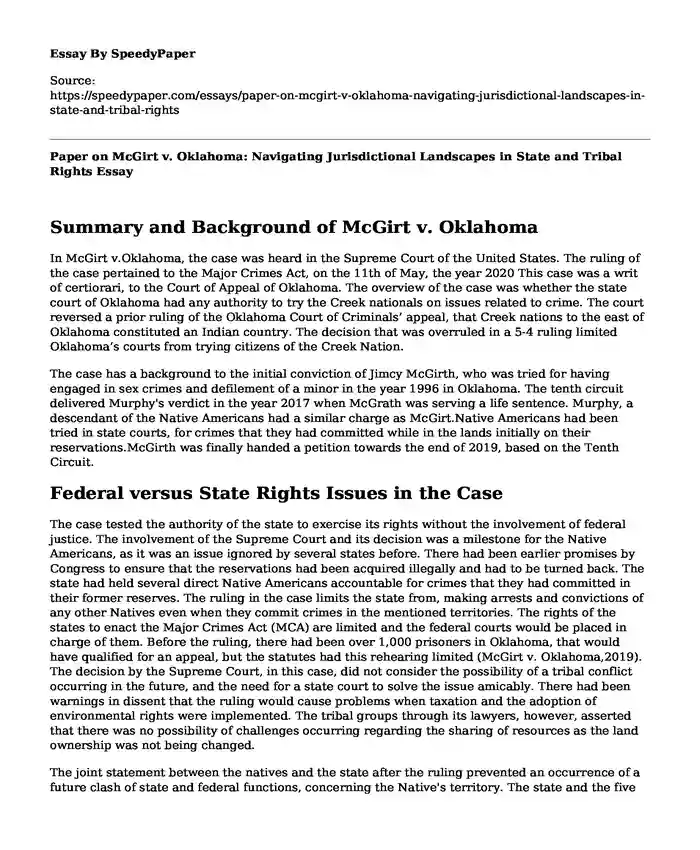
| Type of paper: | Essay |
| Categories: | Law Court system |
| Pages: | 3 |
| Wordcount: | 635 words |
Summary and Background of McGirt v. Oklahoma
In McGirt v.Oklahoma, the case was heard in the Supreme Court of the United States. The ruling of the case pertained to the Major Crimes Act, on the 11th of May, the year 2020 This case was a writ of certiorari, to the Court of Appeal of Oklahoma. The overview of the case was whether the state court of Oklahoma had any authority to try the Creek nationals on issues related to crime. The court reversed a prior ruling of the Oklahoma Court of Criminals’ appeal, that Creek nations to the east of Oklahoma constituted an Indian country. The decision that was overruled in a 5-4 ruling limited Oklahoma’s courts from trying citizens of the Creek Nation.
The case has a background to the initial conviction of Jimcy McGirth, who was tried for having engaged in sex crimes and defilement of a minor in the year 1996 in Oklahoma. The tenth circuit delivered Murphy's verdict in the year 2017 when McGrath was serving a life sentence. Murphy, a descendant of the Native Americans had a similar charge as McGirt.Native Americans had been tried in state courts, for crimes that they had committed while in the lands initially on their reservations.McGirth was finally handed a petition towards the end of 2019, based on the Tenth Circuit.
Federal versus State Rights Issues in the Case
The case tested the authority of the state to exercise its rights without the involvement of federal justice. The involvement of the Supreme Court and its decision was a milestone for the Native Americans, as it was an issue ignored by several states before. There had been earlier promises by Congress to ensure that the reservations had been acquired illegally and had to be turned back. The state had held several direct Native Americans accountable for crimes that they had committed in their former reserves. The ruling in the case limits the state from, making arrests and convictions of any other Natives even when they commit crimes in the mentioned territories. The rights of the states to enact the Major Crimes Act (MCA) are limited and the federal courts would be placed in charge of them. Before the ruling, there had been over 1,000 prisoners in Oklahoma, that would have qualified for an appeal, but the statutes had this rehearing limited (McGirt v. Oklahoma,2019). The decision by the Supreme Court, in this case, did not consider the possibility of a tribal conflict occurring in the future, and the need for a state court to solve the issue amicably. There had been warnings in dissent that the ruling would cause problems when taxation and the adoption of environmental rights were implemented. The tribal groups through its lawyers, however, asserted that there was no possibility of challenges occurring regarding the sharing of resources as the land ownership was not being changed.
The joint statement between the natives and the state after the ruling prevented an occurrence of a future clash of state and federal functions, concerning the Native's territory. The state and the five tribes displayed their understanding of the framework of the jurisdiction and promised to preserve the sovereignty of self-government while conforming to the procedures and law. The ruling was in line with the 18 U.S.C &1151, which defines the Indian country in three ways:
- A land within the limits of reservations initially belonged to the Indians and was to be placed under the jurisdiction of the United States of America (McGirt v. Oklahoma,2020).
- A land of independent Indian tribes, with its borders within the United States of America, within or without the limits of a state.
- Indian allotments, and Indian titles, were not extinguished.
References
McGirt v. Oklahoma, 140 S. Ct. 2452, 591 U.S., 207 L. Ed. 2d 985 (2020).
McGirt v. Oklahoma, 140 S. Ct. 659 (U.S. 2019).
Cite this page
Paper on McGirt v. Oklahoma: Navigating Jurisdictional Landscapes in State and Tribal Rights. (2023, Dec 23). Retrieved from https://speedypaper.net/essays/paper-on-mcgirt-v-oklahoma-navigating-jurisdictional-landscapes-in-state-and-tribal-rights
Request Removal
If you are the original author of this essay and no longer wish to have it published on the SpeedyPaper website, please click below to request its removal:
- Banning Guns Would Be Bad for the Economy - Gun Control Essay Sample
- Free Essay Example on Drugs Legalizing
- Essay Example on the American Legal System and the Federal Judiciary
- Free Essay: Criminal Investigation for a Homicide in an Apartment Building
- Essay Sample on Real Estate Disclosure Laws
- Essay Sample on Students Should Not Have Guns in Texas Schools
- Paper Example. Texas Trial Lawyers Association
Popular categories




